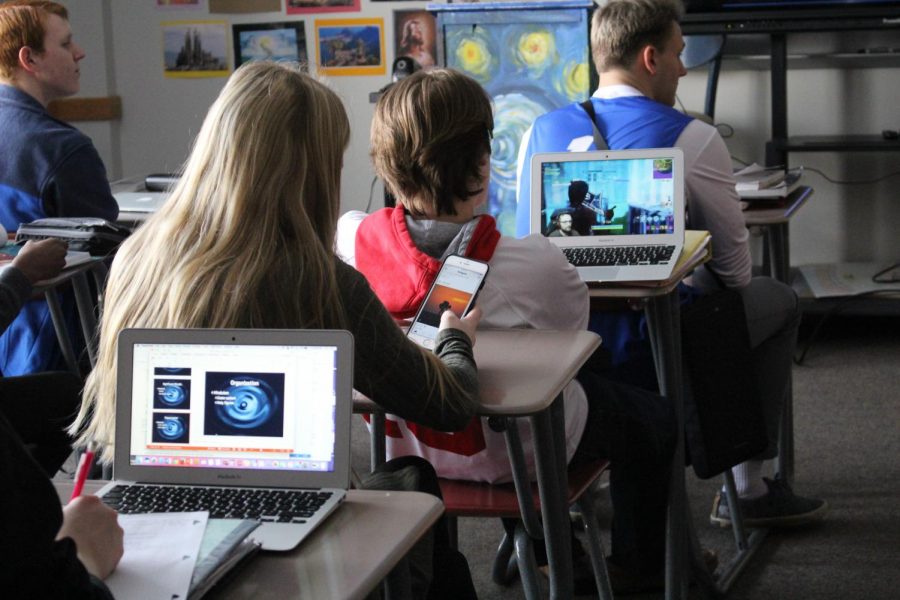With distractions more prevalent than ever, many students tend to lose focus in class. Some scroll through social media on their phones, other watch videos, while some even play computer games; nevertheless, distractions take students away from their work and learning.
Many distractions affect students on a daily basis
With social media, games, and technology, distractions are more prevalent than ever. These diversions take students away from their work, and in most cases, have very negative consequences.
With the current rise and accessibility to technology, many tend to find more distractions and diversions in everyday life. As the time changes, what is distracting changes as well. This lack of focus not only affects students and their attention to their learning, but many other members of the BSM community.
The meaning of distraction is similar for the teachers, help desk staff, and students. Distractions often take the form of social media, talking with friends, games, and streaming. “[Distraction is] something that’s drawing your attention away from what you should be doing,” theology teacher Matt Brounstein said.
No matter what perspective a person takes on distraction, distraction is taking attention away from something. However, it is prevalent that what is distracting has changed over time. “I think it has become more and more easier to be distracted, but it’s not new,” Help Desk Manager Bill Cheney said. In a poll with 148 responses, 39.2% of people said they felt distracted more than five times during an average class.
The big thing that people notice is that newly created technologies are the most distracting. “I think people used to get distracted less, and I think now with technology, it’s easier for people to get distracted in the moment,” junior Chris Wilson said.
During class, most students become distracted by technology. Students can be distracted by many different websites on the internet. “A time [I was distracted was] when I was going on my computer online shopping or going on instagram,” junior Stella Fortier said. In a poll with 146 responses, 12.3% of people thought that online shopping was the website that distracted them the most.
When students are distracted during class by technology like games, online shopping, or social media, teachers notice. This can be problematic when students’ attention is diverted away from the lesson or class plan. “Last period we were playing a review game and a student was, my guess is, playing some sort of a video game with his headphones in and it was his turn to play in the review game and he just was like not aware of any of his surroundings,” theology teacher Michael Becker said.
Most students realize that they get the most distracted during their free period. With no one watching it is easier to get distracted. “I was in my free hour with my friends and I was supposed to be doing my history homework and then everyone around me was playing games and it looked really fun and then I started playing games and got no work done,” sophomore Kalli Anderson said.
Now that it is becoming easier to become distracted, it is even more important to pay attention and concentrate on focusing. The reality is that the majority of people get sidetracked and distracted very often, thus the overall attention span of people has decreased over time. “I think kids definitely have less attention spans now than we used to. When I was in school, we were forced to pay attention, like literally just forced to sit there and pay attention and be quiet,” science teacher Jennifer Roushar said.
A limited attention span is not the only risk of distractions. Diversions increase the time it takes to get work done and decreases the quality of it. So, although technology is entertaining and beneficial, if it is not used at the proper time, it can turn into a problem. “I think I take a lot longer to do my homework because of distractions,” senior Sarah Pucel said.
Distractions can also take attention entirely away from work that needs to be done. Therefore this can result in negative effects on scores and grades. “The night before I had a major history test freshman year, I stupidly decided to spend it on Netflix… didn’t do well on that test,” sophomore Joey Trella said.
In efforts to eliminate the negative effects of distractions, the help desk staff has plans to install an application called Cold Turkey. Cold Turkey is an application that allows users to temporarily block certain sites on the internet like social media, games, and Netflix. “Cold Turkey is an application that lets you really sift out and pick certain websites or things that distract you and it really helps you kind of manage your own time,” Cheney said.
Although this application seems to be very controlling, the help desk wants to specify that the students have the option to use it or not. The application’s intent is to be a tool that the students can use to help themselves and not an overseer designed to limit your every move. “[It is] putting the control in the student’s hand because we don’t want to cut you off cold turkey. The pun kind of sticks that we don’t think that you should just block all these websites and never use them. It’s not realistic,” Cheney said.

